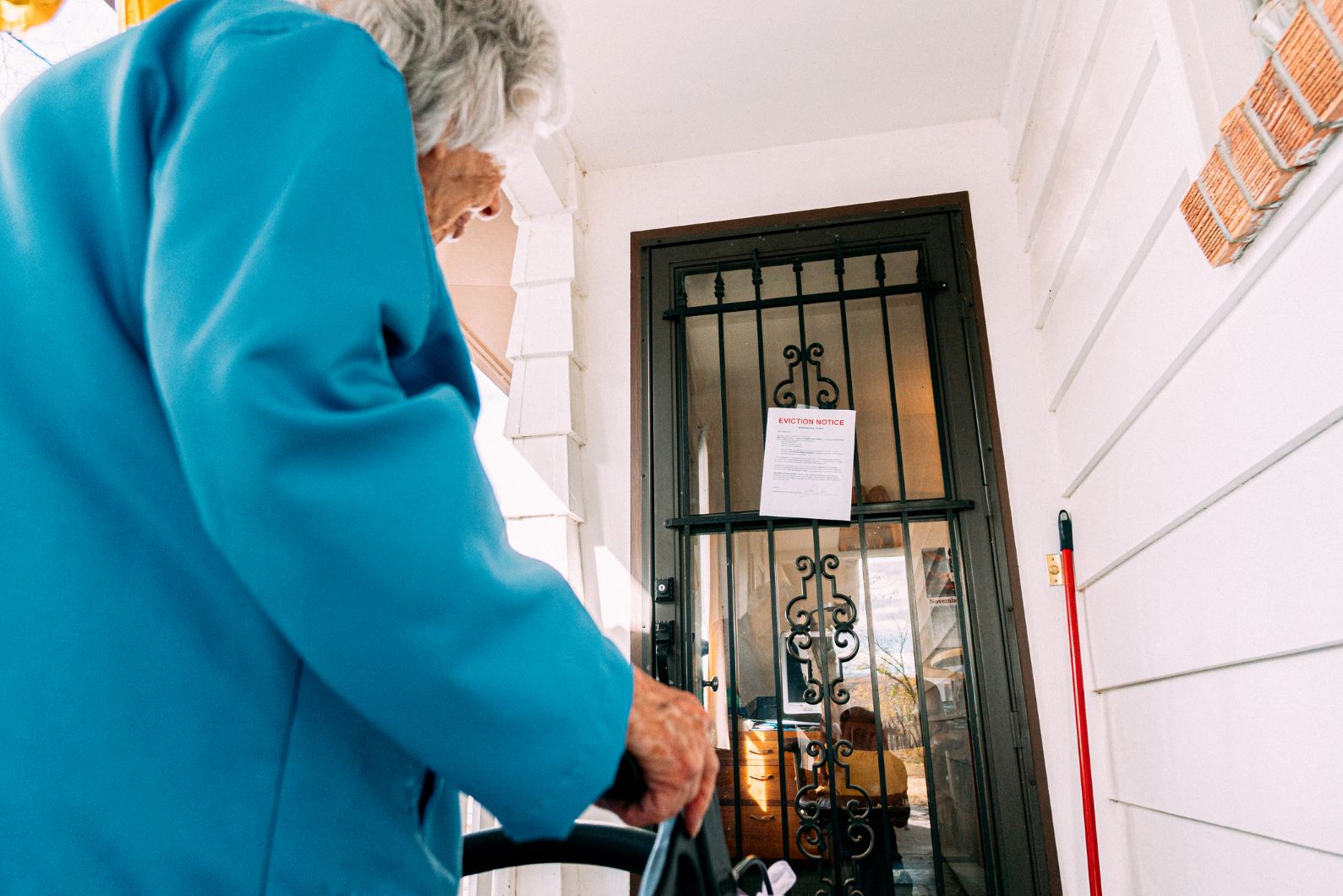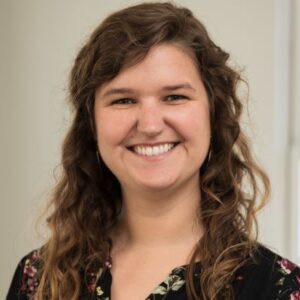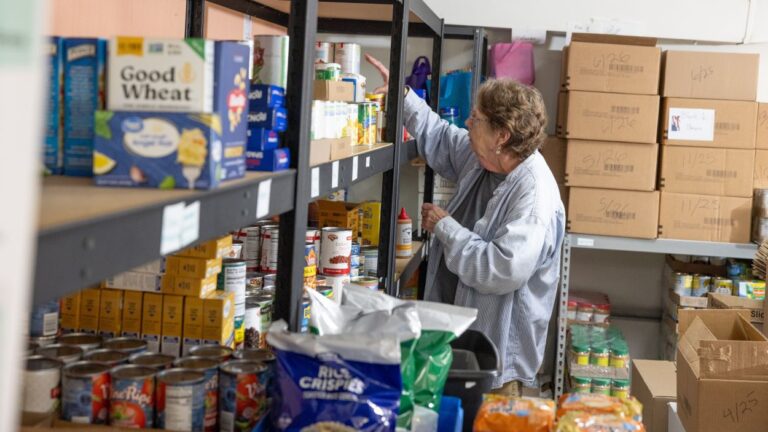A few years ago, Adult Protective Services put Polly Madson Cox in touch with an older woman who was neglecting herself. She lived alone, struggled to meet her basic needs and was on the verge of eviction.
Madson Cox, who was an advocate with the Elder Abuse Institute of Maine, worked with the woman to try and find a way to stay in her apartment. During that time, the woman invited someone to live with her. Madson Cox soon learned this person was exploiting her, controlling her medications, ability to leave the house and her finances.
A recent study found this is a common problem. An analysis of Maine APS investigations published online last month by the Journal of the American Geriatrics Society found that older adults who neglect themselves often experience other mistreatment at the same time and are at risk of further abuse.
Addressing cases of self-neglect may prevent later abuse, said the study’s lead author, Dr. Stuart Lewis, an associate professor at Dartmouth’s Geisel School of Medicine.
Advocates in Maine said the study findings reinforce the work of a program that was piloted in 2019 under the Elder Abuse Institute of Maine.
“Self-neglect is a huge unmet need in elder mistreatment,” Lewis said. “It has been, historically, a very difficult circumstance to intervene in ways that provide benefit to the person.”
Despite Madson Cox’s efforts, her client was eventually evicted. She worked with the woman as she moved to a hospital, then later into an assisted living facility. She was evicted with only the clothes on her back, so Madson Cox helped her get more clothing and regain access to her finances.
“I think we are incredibly instrumental and a special program,” Madson Cox said. “To meet all those needs, to be able to be involved with her all those months. In that case she was in three different counties across the state of Maine — and I was the sole constant for her.”
Self-neglect, which makes up half of APS investigations nationally, occurs when someone no longer has the capacity for self-care.
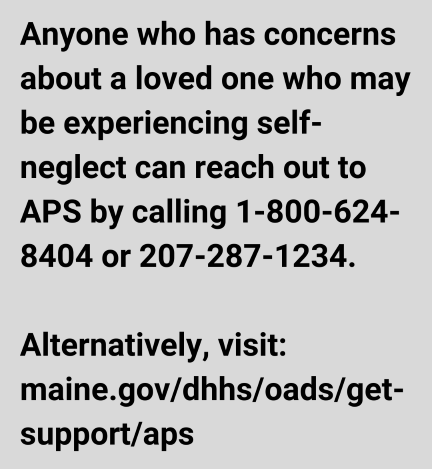
Often this means failing to eat appropriately, care for their home, maintain good hygiene or manage their financial affairs, according to the 2021 Adult Maltreatment Report by the U.S. Department of Health and Human Services.
Madson Cox said some indicators of self-neglect could be unsafe housing, such as holes in the roof, rotted floorboards or an infestation; unpaid bills, disabled utilities or banking concerns; concerns about hygiene; and lack of access to medical care or trouble managing their medications.
Patricia Kimball, the study co-author and executive director of the Elder Abuse Institute of Maine, said it’s difficult to address self-neglect because clients often don’t see themselves as victims. Even the term “self-neglect” is stigmatizing, she said, because it blames the person for their situation when there may be factors out of their control.
To examine how self-neglect relates to other forms of mistreatment, researchers analyzed nearly 18,000 Maine APS investigations from July 2017 to October 2021, looking at cases in which the first substantiated allegation was self-neglect.
The study found that about half of the individuals who were first reported for self-neglect also experienced other mistreatment at the same time. And almost 40 percent of elder mistreatment cases began with self-neglect.
The study found that the time period between a report of self-neglect and another allegation is often less than a year, ranging from 215 to 388 days, much shorter than what was published in a previous study, Lewis said.
“What’s important about it is (self-neglect) often occurs at the same time as other forms of abuse; that it’s a risk factor for later abuse; and that by treating it, you may potentially prevent other abuse later on,” Lewis said.
Self-neglect shares risk factors with other elder mistreatment, such as physical disability, social isolation, cognitive impairment and lack of social support, according to the study.
The study was conducted using Maine APS cases collected during a pilot program of the RISE model. This model — “Repair harm; Inspire change; Support connections; Empower choice” — is a new national approach designed to address elder abuse in a way that reduces harm while respecting the individual’s autonomy. Advocates refrain from pressuring clients to make certain decisions about their lifestyle and only provide the support the client seeks, Madson Cox said.
“We respect that clients have the right to make their own decisions and we understand that clients have that right even when their choices might make us or other people uncomfortable, or might make choices that are in opposition to those people around them,” Madson Cox said.
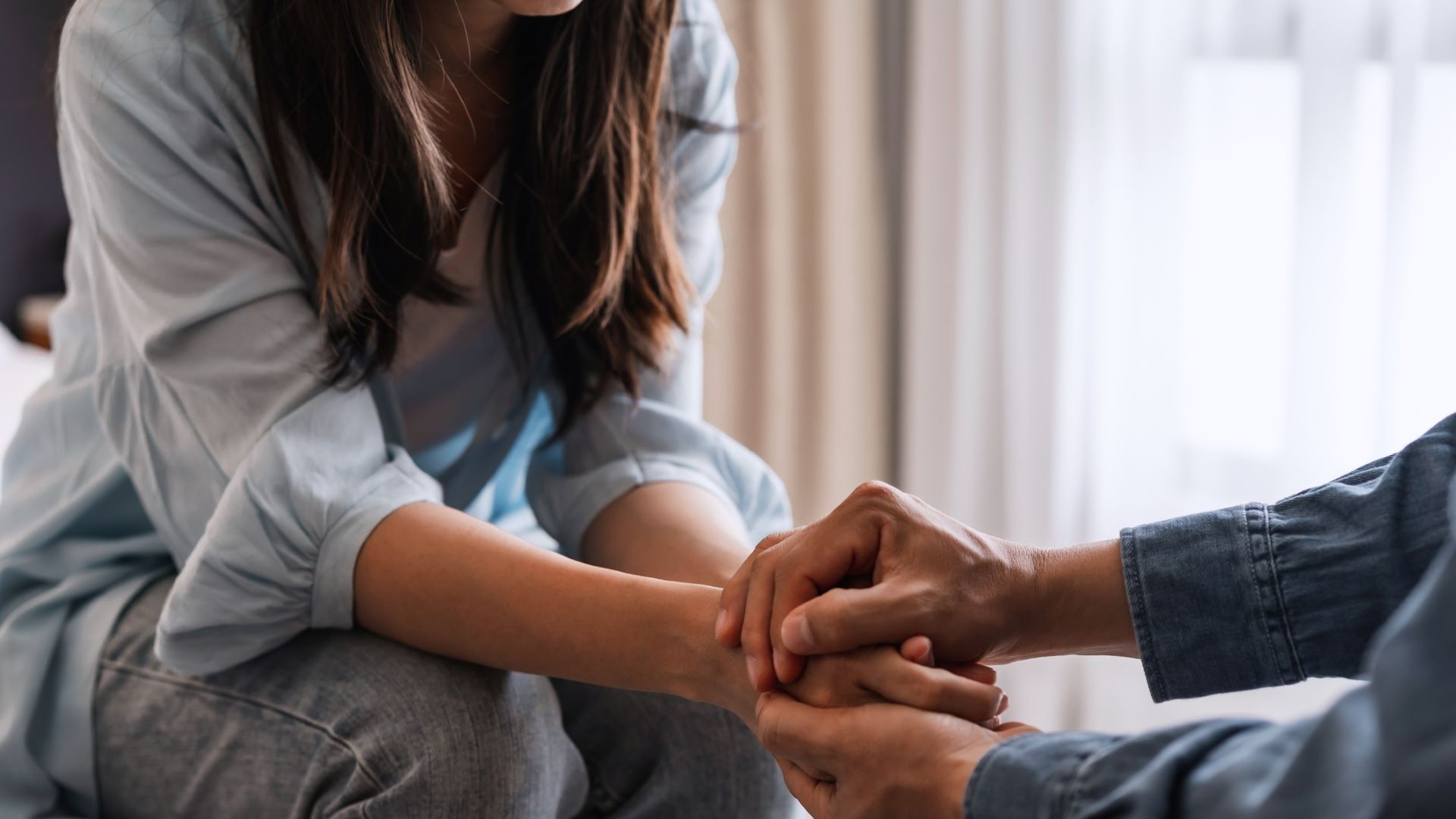
Maine’s RISE pilot project, called Elder Service Connections, started in 2019 by pairing advocates from the Elder Abuse Institute of Maine with APS caseworkers to work on investigations in Aroostook and Cumberland counties.
The advocates were trained in motivational interviewing and supported decision-making, and were able to stay with clients long after APS might be required to close a case. Madson Cox said the time they work with clients can vary greatly, but is usually less than a year.
Data shows the RISE approach works: Clients are significantly less likely to end up back in the APS system after working with a RISE advocate.
To date, the program has received 752 referrals. It expanded in 2021 to include the entire state, and there are currently eight advocates. The budget Gov. Janet Mills signed last year dedicated $800,000 annually to the program.
Madson Cox, who worked as a RISE advocate for about a year and a half and now oversees the program, said she has seen the findings of the self-neglect study mirrored in her work.
She mentioned the case of a woman in her 70s who was reported for self-neglect because her furnace wasn’t working. The woman had no hot water, struggled to get her snow plowed and was heating her home by using the oven and space heaters. She was paying an exorbitant electric bill, had trouble bathing without hot water and couldn’t get out of her home to access health care.
Advocates spent months working with her, and Madson Cox said as they got to know the client, she disclosed that a community member was financially exploiting her by charging an excessive price for snow removal, and a family member was being verbally abusive and stealing her medication. The advocates were able to fix the furnace, help with the utility bill, secure a new snow removal service and get her medication delivered directly.
“We have the luxury of being able to work with people for a much greater amount of time,” Madson Cox said. “Some of the (conditions) were known as the client became comfortable with us and began trusting us to disclose.”
The RISE system can also work with others in the client’s orbit, including someone who may be exploiting them, Kimball said.
This approach recognizes that often what the older adult wants more than anything is help for a loved one who may be struggling — with addiction, for instance — even if they are the ones exploiting them.
“Often in maltreatment and abuse situations, our clients want the alleged harmer to get help,” Madson Cox said. “They’re not in a place to make choices to sever the relationship or be estranged.”


